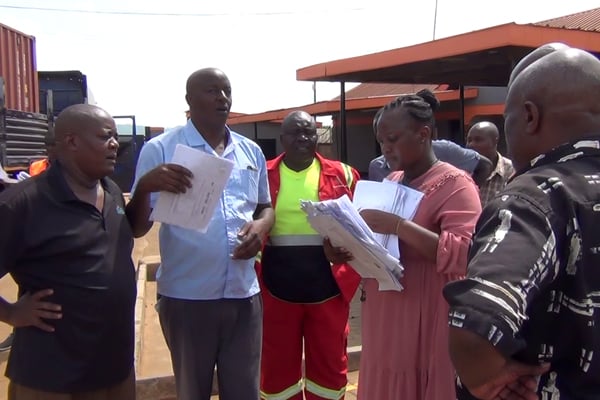Prime
URA starts releasing impounded trucks

Ms Josephine Nakimera, the manager of Chickways Uganda Ltd, issues entry and provisional release forms to drivers at the Malaba border on October 20, 2022. PHOTO/DAVID AWORI
What you need to know:
- The tax body attributed the earlier glitch to traders’ alleged refusal to sign an indemnity.
Uganda Revenue Authority (URA) has, for the next 30 days, provisionally started releasing about 131 cargo trucks loaded with raw materials for animal and poultry feeds destined for Kampala, a month after they were impounded at the Malaba border.
By Wednesday evening, about 60 trucks had been allowed to exit the DOJ and JOJ inland container depots (ICDs) where they had been held following a provisional release letter written by Mr Geoffrey Owich Okaka, the Assistant Commissioner Trade at the tax body.
The trucks had been impounded by URA which said it was implementing a new tax policy announced last month.
Mr Ibrahim Bbossa, the assistant commissioner for public and corporate affairs at URA, said the amended VAT Act (2017) had zero VAT and zero import duty on premixes, an inferior type of a nutrient which constitutes about 4 percent of an entire animal feed.
However, along the way, people started bringing concentrates, which are an improved version of what is added in the animal feed.
“There is a difference between premixes and concentrates, and that is where the whole war (between URA and the traders) is beginning,” Mr Bbossa said in an interview on Wednesday.
“While the law was protecting premixes, it says any other items that aren’t a premix have to pay import duty, and when something is paying import duty, in the VAT Act it has to pay 18 percent. What our traders are doing is bringing concentrates and declaring them as premixes, and many of them are big traders who bring in cargo worth €500,000,” Mr Bbossa added.
He acknowledged that there was a hiccup, but explained that it was as a result of the traders’ alleged refusal to sign an indemnity.
He added that they couldn’t clear goods especially where there is an implication of a tax, but have provided a 30-day window, which started on Monday to clear goods but after a letter of indemnity has been signed.
The indemnity, Mr Bbossa said, states that at the end of the day, when a verdict comes out that the traders are supposed to pay a tax, URA shall go back to them because the law allows it to do so.
Indeed, in an October 10 letter addressed to KOUDIJS Uganda Ltd, an importer of the animal feeds concentrates, URA writes: “In the spirit of trade facilitation, a deed of indemnity has been signed, indicating your commitment to pay any arising taxes on your imports of feed concentrates”
It adds: “Should you be found liable, similarly this indemnity serves to allow clearance of your imports. . . ”
Ms Josephine Nakimera, one of the clearing agents at Malaba border, said following the provisional release order directive from URA, 60 cargo trucks carrying feed concentrates had left Malaba border for Kampala.
“I have so far cleared 60 cargo trucks which have left Malaba border for Kampala and I still have more to clear,” Ms Nakimera said.
She added that whereas they were finally happy that the cargo was leaving the border for Kampala, the declarations that had been made as they processed the provisional release of the trucks brought information indicating that the importer was to pay taxes.
“The cargo has been released without the importer paying any taxes to URA, although details of the declaration we made indicate that there are some taxes the importer has to pay,” Ms Nakimera said.
However, the development has come at a cost to KOUDIJs Uganda Ltd. Ms Nakimera said the transporters are demanding Shs1.5b as “waiting fees” from the importer, while DOJ and JOJ inland container depots want more than Shs43m in parking fees for 86 trucks.
Mr George Odima, the manager at the inland container depot, said for the delays, the importer was to pay more than Shs500,000 for each truck, implying that the total charges for all for the time they have been parked at the premises comes to more than Shs50m.
Mr Faisal Senabulya, the director of Chick Ways clearing firm, said the abruptness at which URA implemented the tax policy was “strange” because no importer was informed and no single sensitisation was done.
He said whereas his client was willing to pay his tax obligations, any abrupt policy was bad for the importer and increased the cost of doing business in the country.
Mr Peter Sireka Namalwa, the chairman Uganda Clearing Agents and Forwarding Association at Malaba border, said the issuance of the temporary release of the trucks has eased congestion. “We have been having 46 containers of the animal and poultry feeds concentrates that were brought in and offloaded, plus the 86 cargo trucks that were bringing in feeds for KOUDIJs; this was already worsening the congestion,” Mr Sireka said.
200 drivers relieved
The release of the cargo has brought relief to more than 200 previously distressed truck drivers and their turn men who have endured tough times as they waited for clearance of their cargo for a month. Mr Francis Wabuwa, one of the truck drivers, said once he delivers his cargo, he will drive home to meet his family which he has reportedly caused a lot of misery. Mr Suleiman Siudu, another truck driver is, however, worried that his road user permit had expired while waiting and feared that he might be intercepted and his truck impounded. He said each foreign-registered truck entering the country going to Kampala pays Shs150,000 as road user fees which lasts for less than 21 days.




